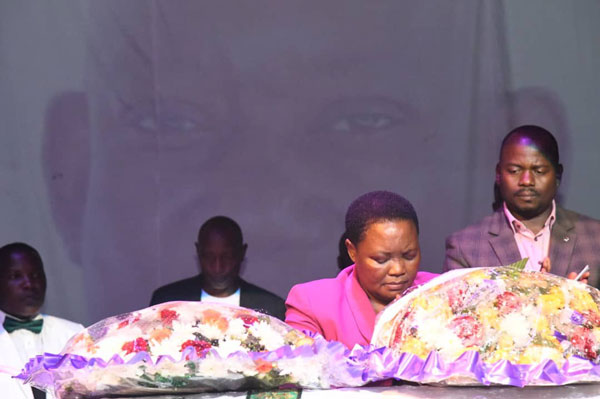
Kampala, Uganda | THE INDEPENDENT | Paul Kato Lubwama, a highly respected artist known for his significant contributions to modern art and creativity in Uganda has received a remarkable tribute at the National Theatre in Kampala.
It is uncommon for an artist to be honored at this renowned institution, which is considered an icon of artistic expression in the country.
On Monday, art and creatives enthusiasts gathered at the theatre to honour Kato Lubwama. They commenced the day by playing classic music composed by the late artiste, setting a nostalgic and somber tone. Later, a band and dancers performed to the tunes, creating a poignant atmosphere as the casket was brought in.
Near the entrance, a special area was designated to display the portrait of the departed artiste. Mourners had the opportunity to lay wreaths and sign the mourners’ book, sharing fond memories of the artist’s achievements in both art and politics.
Around midday, the body was brought at the theatre, accompanied by a grand procession of vloggers, musicians, and dramatists several donned in T-shirts with inscription “RIP Kato Lubwama”, “RIP Uncle Kato” “You will be Remembered” RIP Hon Kato Lubwama, Solida”.
As the body was rolled through the gates of the historic building, which was constructed during the time of Andrew Cohen’s governorship, the crowd chanted, “Here comes our hero! He will be remembered!”
Inside the auditorium, various artists took the stage, singing Kato Lubwama’s famous songs as a tribute to his legacy. They also screened his plays, dramas, and skits, evoking powerful memories for the captivated audience in the packed auditorium.
Despite the limited space inside, preventing many from entering the auditorium, the premises remained filled with hundreds of people. Although there were no screens provided outside for those unable to enter, they engaged in conversations, reflecting on and discussing the remarkable life and work of the late artist.
As the casket arrived inside the auditorium, Mariam Ndagire, a respected figure championing women in music and drama, was already on the stage with an emotional, moving and heartfelt performance of the very first song that Kato had composed for her.
The casket carrying Kato Lubwama’s body was positioned at the center of the stage, with Kato’s cherished guitar placed in front of it. Stand adorned with beautiful flowers were arranged at each end of the casket, creating an elegant atmosphere. Additionally, a portrait of Kato was placed on the right side of the stage, honoring his memory during the event.
Mariam Ndagire delivered a tribute, expressing her gratitude and honoring the legacy of the deceased. She fondly remembered their strong friendship and the special bond they shared, characterized by open and honest conversations about personal matters. Ndagire admired the deceased for his sincerity and willingness to point out her flaws with genuine concern.
Another impactful tribute of the day came in the form of a powerful poem delivered by Aloysius Matovu Joy, a veteran actor, playwright, and poet.
In his poem, Matovu eloquently captured the various facets of Kato’s life, from his journey in drama, radio, to politics. He highlighted Kato’s unwavering courage and determination, while also incorporating moments of humor, a characteristic that defined the late artist and politician.
In the concluding verses of his poem, Matovu skillfully addressed the prevailing socio-political state in the country. With a touch of satire, he appealed to a deceased comrade to implore God; when he seeing him to intervene in the matters of Uganda since the current living generation appears to have been unsuccessful in bringing about the nation’s liberation.
John Ssegawa, who had a close working relationship with Kato Lubwama, shared in his eulogy the journey of drama and creativity they embarked on when they were young individuals in the industry. During their twenties, Ssegawa reminisced about the dreams they had to establish a creative hub that would encompass a theater, a studio, a training school, and hostels.
Unfortunately, their dream was partially shattered due to divisions that arose in Black Pearls leading to formation of Diamond Ensemble; founded by the deceased, Ashiraf Ssimwogerere, and Mariam Ndagire. Subsequently, Ndagire left Diamond Ensemble and joined Abbey Mukiibi and John Ssegawa to form another drama group called Afri-Talent.
Reflecting on their shared history, Ssegawa advised young artists against forming collective organizations at a young age, as their judgment may not be fully developed. He also cautioned them against accepting government funding, as he believed it to be detrimental, and encouraged them to avoid involving politics in their art, as it could potentially undermine their creative endeavors.
Abbey Mukiibi, a lifelong friend of the deceased, portrayed him as a determined individual who possessed aspirations and relentlessly pursued the realization of his dreams. These ambitions encompassed ventures such as establishing a television station, constructing a theater, and venturing into politics.
According to Mukiibi, the deceased must have departed this world feeling fulfilled, contented, and accomplished as a person who successfully brought his dreams to fruition.
Additionally, Mukiibi mentioned that during the challenging moments of their careers when their spirits were low and they contemplated giving up, Kato-Lubwama remained a beacon of hope. He stood by their side, providing guidance and support, which allowed them to persevere through those dark hours.
Another notable aspect witnessed during the event was the profound sadness displayed by mourners and speakers when discussing the Catholic Church’s decision to deny the deceased a requiem mass.
Ashiraf Ssimwogerere, who has known the late for the last three decades and was his best man on his wedding, couldn’t hide is discontent with the churches decision saying that the deceased never denounced his being Catholic.
Kato Lubwama is said to have owned a traditional shrine at his home contrary to the Catholic Church doctrines. However, Ssimwogerere added that it is not the place of the living people to pass judgment on the deceased. He advocated for giving the deceased a proper send-off and allowing him to present his case before God.
*****
URN
 The Independent Uganda: You get the Truth we Pay the Price
The Independent Uganda: You get the Truth we Pay the Price


